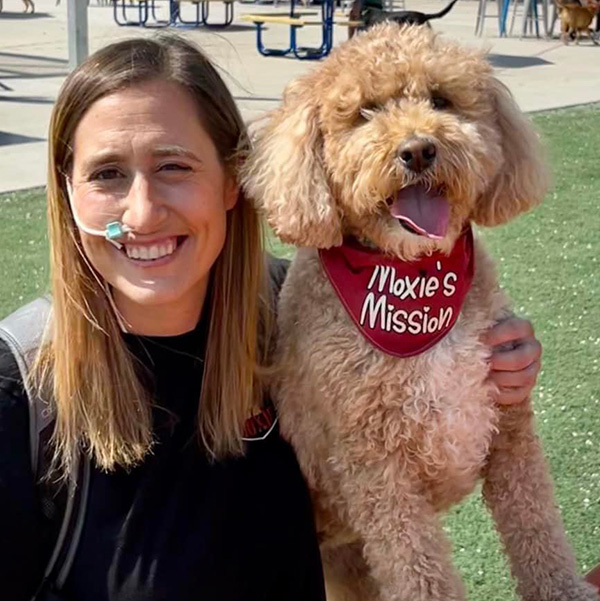Katie’s story
Living with gastroparesis isn’t the only challenge Katie has overcome. A dedicated advocate, she’s open about her complex health journey in the hopes of helping others.

Katie, Enterra® Therapy patient
As a high school social worker, an accomplished athlete, and a published author, Katie has always put her passions to work.
Now, after being diagnosed with both a rare tissue disorder and gastroparesis, Katie is keen to bring that same dedication to help others living with complex and chronic health concerns.
Start of symptoms
Around 2012, I was diagnosed with Ehlers-Danlos Syndrome, which is a connective tissue disorder. It caused a whole host of struggles, but with the support of my doctors, family, friends, and my service dog, Moxie, I got things figured out.
But then one day, I couldn’t eat.
And I knew there was just something different going on. Because it wasn’t that I didn’t want to eat, it was that I’d start to eat and then, all of a sudden, I felt like I had eaten a whole Thanksgiving meal.
It got to the point where I was throwing up all the time, I was having horrendous stomach pain, and just 24/7 nausea. When I would eat, it felt like I was like being stabbed in my stomach. I had such terrible bloating that, some days, I looked like I was like 9 months pregnant.
Diagnosis
After months of having awful symptoms, I did a 4-hour gastric emptying study (GES), and it showed gastroparesis.
So, I found a GI specialist to address my gastroparesis—but she said she didn’t really believe my GES results, and insisted that I do a 2-hour GES. For some reason, she felt that it would be more accurate.
I thought, “Hmm. That goes against all of the research I’ve done.” But it’s hard to challenge a doctor, so I went ahead and did the 2-hour GES. And it did not show gastroparesis.
This doctor was adamant that I had slow motility, but no structural issues, and that it was basically all in my head, And I just thought, “I don’t think that’s true. I wish it was true—but I know I’m not making this up.” I was eventually given the diagnosis of functional Dyspepsia instead of gatroparesis.
I even brought up to her this treatment that I had researched, Enterra Therapy, and asked her if she thought it might be an option for me.
Her response was, “You don’t have gastroparesis, and besides—no surgeon will put an Enterra Therapy System in a patient whose gastroparesis is not caused by diabetes.”
I told her, “Well, that’s not true. I’ve done my research, and I know of a lot of people without diabetes who have gotten it and who it’s helped. Can we explore it a little bit more?”
She said no.
By this time, I was losing weight left and right. I was an athlete—I used to be a pretty solid person in terms of weight—but I was down to 103 pounds, with clothes on. I was just dwindling away to nothing.
So I found another doctor.
At one point I tried an NJ tube, which went through the nose and into my intestine. It was horrendous.
I’m a social worker, so I talk all day. I was getting blisters all over my throat, the tube was wrapping around my vocal chords—it was a mess.
Then we tried a J tube, which went directly into my intestines. The J tube almost killed me, literally. It caused intussusception several times and kept getting infected because of my Ehlers-Danlos, and caused a ton of serious complications, including becoming septic.
At this point, I was seeing new doctors at the new hospital I was admitted to. The issue then became: You can’t have a feeding tube, you can’t do other interventions because of your Ehlers-Danlos. What do we do?

They eventually asked me, “What’s this gastric electrical stimulator thing you told us about?”
Receiving Enterra Therapy
Once we determined that Enterra Therapy was an option for me, I was evaluated, found a surgeon in St. Louis, and ended up receiving my system in 2023.
At first, I didn’t really feel the therapy doing anything.
I remember feeling so cautiously optimistic—you feel hope, but you don’t want to hang on to it too much. I had been knocked down so many times, and mentally, I just couldn’t handle another disappointment. But my doctors just kept saying, “Just be patient. Please just be patient with us.”
But I remember—I was sitting on my couch and, all of a sudden, went, “Oh, my gosh—what is going on?”
Then it hit me: I was hungry.
I didn’t even remember what it felt like to be hungry! I thought, “What do I do?” I was so caught off guard; I wasn’t really prepared to feel hungry.
So, I ate a little bowl of oatmeal because it was all I really had around, and it was the first time that I ate something and wasn’t in excruciating pain and it stayed down.
It was just… a moment. I remember writing on Facebook, saying that I just ate a bowl of oatmeal. It felt like I was telling people that I won 20 million dollars.
And I think, for a lot of people, they really realized, “Wow, something we take so for granted, she’s celebrating.” And I really felt like they were celebrating with me.
Life now
It hasn’t all been smooth sailing—I still have to figure things out because I have other health issues. I’m learning how to eat again, after not being able to for about 3 years or so. I eat small portions throughout the day. It’s kind of an experiment, and that’s the hard part: what works for me may not work for other people with gastroparesis, and vice versa.
But because of the nutrition I’m able to get now, I’ve been able to build muscle naturally, which is something that I struggled with for a long time. And it’s the only reason that I’m able to play wheelchair tennis, which I never thought I would be able to do. What that has brought to me, mentally, is huge.
My goal in my life is always to share my story: with my dog, Moxie, with my mental health, with my physical health, everything. I’m open about my entire journey, because I believe that breaking the stigma of not being okay is important—and incredibly powerful.

Katie’s experience is unique to her and individual results may vary.
Could Enterra Therapy be Right for You?
Answer a few short questions to see if you may be a candidate and get a downloadable guide to help you start a conversation with your doctor.
MKT-D-0003, Rev V
IMPORTANT SAFETY INFORMATION
Enterra Therapy for treatment of chronic, resistant to medication nausea and vomiting associated with gastroparesis caused by diabetes or an unknown origin in patients aged 18 to 70 years: patients should always discuss potential risks and benefits of the device with their physician.
*HUMANITARIAN DEVICE
Authorized by Federal law for use in the treatment of chronic intractable (drug refractory) nausea and vomiting secondary to gastroparesis of diabetic or idiopathic etiology in patients aged 18 to 70 years. The effectiveness of this device for this use has not been demonstrated. What does this mean?
